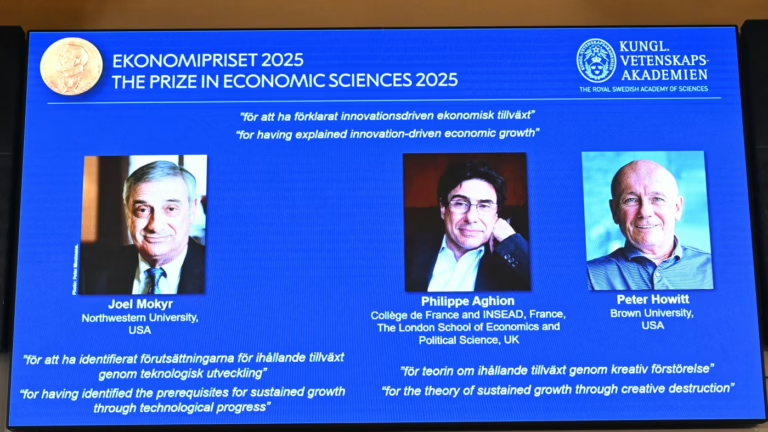From left to right: Images of Joel Mokyr (American-Israeli), Philippe Aghion (French), and Peter Howitt (Canadian) appear on a screen during the announcement of the 2025 Nobel Memorial Prize in Economic Sciences at the Royal Swedish Academy of Sciences in Stockholm.
Jonathan Nackstrand/AFP via Getty Images
toggle caption
Jonathan Nackstrand/AFP via Getty Images
When you chart the trajectory of economic growth over the centuries, the pattern resembles a hockey stick lying flat with its blade sharply rising. For thousands of years, economic progress remained nearly stagnant, but around the dawn of the 19th century, it surged dramatically upward.
This pivotal moment, marking the transition from stagnation to rapid expansion, corresponds with the Industrial Revolution-a transformative era that reshaped human society by dramatically enhancing productivity and living standards.
Yet, this raises intriguing questions: Why did this surge begin around 1800? What factors sustained this upward momentum? And why was Britain the first nation to ignite this economic revolution?
Joel Mokyr, a distinguished economic historian affiliated with Northwestern University and Tel Aviv University, was honored with the 2025 Nobel Prize in Economics for his extensive research addressing these very questions. The other half of the prize was awarded to Philippe Aghion and Peter Howitt for their groundbreaking work on the theory of sustained growth driven by creative destruction.
Mokyr’s analysis highlights the critical role of science and technology in Britain’s unique path. While many civilizations had experienced scientific discoveries and technological innovations before, none had managed to translate these advances into a self-sustaining economic boom that propelled growth beyond previous limits.
Central to Mokyr’s explanation is Britain’s exceptional embrace of the Enlightenment-a sweeping intellectual movement of the 18th century that revolutionized thought in science, philosophy, and politics across Europe. This cultural awakening accelerated technological innovation and fostered a climate ripe for change.
However, the Enlightenment alone does not fully explain Britain’s primacy, since other European countries, notably France, also underwent similar intellectual transformations.
Mokyr’s research suggests that Britain distinguished itself by effectively integrating Enlightenment ideas into practical economic applications. Unlike elsewhere, British scientists and thinkers’ breakthroughs permeated a skilled class of artisans, entrepreneurs, and inventors-individuals who translated grand scientific concepts into tangible “micro inventions.” These incremental innovations collectively reengineered the economic landscape, boosting productivity and fueling unprecedented growth.
Thus, while scientific progress was indispensable, the decisive factor was Britain’s workforce and entrepreneurial class, capable of harnessing and implementing these advances. Additionally, British political institutions, particularly Parliament, were more receptive to the disruptive effects of innovation-often termed “creative destruction”-which challenged established interests and paved the way for economic renewal.
This is where the contributions of Aghion and Howitt complement Mokyr’s findings. Their influential economic model places creative destruction-the process by which new technologies and enterprises supplant outdated ones-at the heart of sustained economic growth.
Originating from the ideas of economist Joseph Schumpeter, creative destruction acknowledges that innovation inevitably displaces existing businesses and jobs, creating winners and losers. Despite resistance from entrenched elites, this cycle of renewal is essential for long-term prosperity.
As the world confronts a new era of disruptive technologies, including artificial intelligence, the insights of this year’s Nobel laureates underscore the importance of embracing innovation and effectively embedding it within the economy to maintain the upward trajectory of growth.
Incidentally, Joel Mokyr has previously appeared on Planet Money, contributing to episodes such as “When Luddites Attack” and “Imagining a World Without Oil.” His work also inspired a fictional audio drama titled “The Last Job.”
If you enjoy exploring the history of ideas and economic progress, consider preordering the Planet Money book, which delves deeper into the causes of economic growth and the role of technology, enriched with engaging visuals. Visit Planetmoneybook.com and share it with friends.






















